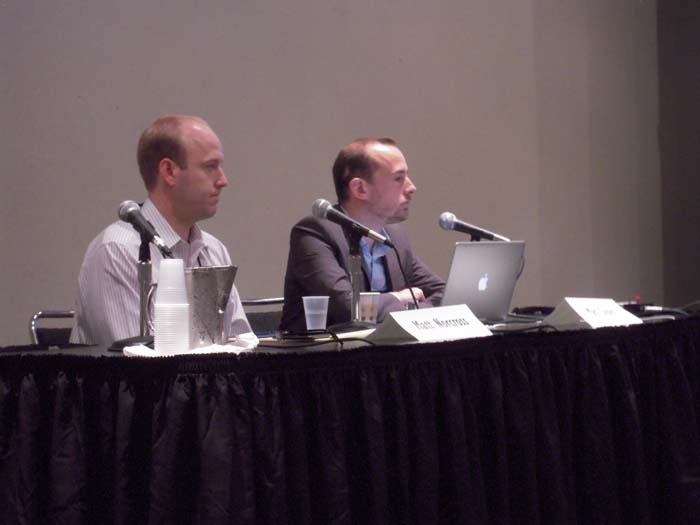E-Books 201: Focus on Staff Training and Customer Engagement [4]
- By Karen Schechner [5]
The ABA Day of Education [6]“E-Books 201” seminar last Monday at BookExpo America [7] was geared toward booksellers actively selling, marketing, or promoting e-books. ABA Technology Director Matt Supko and Matt Norcross of McLean & Eakin Booksellers [8] in Petoskey, Michigan, provided the latest updates and best practices for promoting Google eBooks™ and IndieCommerce sites. The Day of Education was sponsored by the Ingram Content Group.
 |
|
Matt Norcross and Matt Supko address booksellers’ questions during E-Books 201. |
Supko started the session by citing some positive statistics on e-books, including the results of a Verso Digital Survey, which found that 81.7 percent of e-reader owners surveyed said that if e-books are priced competitively, they would buy them from independent bookstores. The number of IndieCommerce stores that have sold e-books is growing, Supko added, and a store’s square footage is not necessarily a determining factor. “Sales have much less to do with store size, and much more to do with communication with customers and customer service,” he said.
In a roundup of other e-book developments, Supko noted that in March Random House adopted the agency model for e-books [9], which means all of the big six publishers are on the agency model; Google eBooks now offers IndieCommerce e-tailers an additional three percent margin; $11.47 is the average e-book selling price, and the categories of e-books sold mirrored that of general stores, with general fiction, literary fiction, and mystery as the most popular.
The session also provided a look at the latest updates to IndieCommerce sites [10], which include:
- Mobile Theme: Smartphone users who visit a bookstore’s IndieCommerce website will now see a special, mobile-optimized version of each page. The store site will automatically detect the customer’s device and render each page using the mobile theme if appropriate.
- Givex Gift Card: Customers can now purchase Google eBooks using Givex gift cards. If the gift card balance is not enough to cover the e-book purchase, the customer will be prompted to enter a credit card as well. For IndieCommerce stores that are not using Givex, ABA staff is working on a website gift code module that will allow the store to generate gift certificate codes. Although there is currently no set time for the module’s launch, it is expected to be ready well in advance of the holidays this year.
- Google Federated Login: Customers will soon be able to log into IndieCommerce sites using their Google account. This should simplify the transaction and reduce customer confusion. This feature is expected to launch in the next few weeks.
Following Supko’s review of the newest IndieCommerce features, Norcross ran through some of his store’s best Google eBooks practices. “We went live with Google eBooks before the holidays, and since then I’ve been trying to get my head around how best to promote them,” he said.
At McLean & Eakin Booksellers [8], every staff member goes through the process of buying a Google eBook. “This was a turning point for our staff,” said Norcross.
The bookstore also held a technology seminar, and plans to do more of the same. The event was heavily staffed so customers could get a one-on-one consultation on their own e-reader device. The goal for each staff member was to sell an e-book. “If we didn’t get the customer’s account set up then, we’d otherwise lose the sale,” said Norcross.
McLean & Eakin posts information about its website and Google eBooks, as well as QR code shelf-talkers [11], throughout the store. “We have signage at registers, in the bathroom,” Norcross said. Shelf-talkers are generated from the Indie Next List and are incorporated into event displays and in e-newsletters. The bookstore also displays a QR code on its front and back door signs that say, “Sorry, we’re closed but you can scan here and it will take you to our website.”
Educating customers about e-books is not a six-month effort, said Norcross. “It’s ongoing.”
Maryelizabeth Hart from Mysterious Galaxy Bookstore [12] in San Diego considered the best takeaways from the session “the variety of ways suggested to grow customer awareness of the availability of e-books through IndieCommerce sites” using in-store marketing tools like bookmarks, shelf talkers, etc. “It reminded me of the early days of making sure we included our website info on all of our marketing materials,” she said.
“I thought E-Books 201 was useful because it went beyond the technical aspects of the Google eBooks program, and provided helpful tips on how to train staff and engage customers through petting zoos and gift card incentives,” said Casey Coonerty Protti of Bookshop Santa Cruz [13] in Santa Cruz, California. “The customer service piece of the e-book program is often overlooked but is really the central aspect of what we need to offer.”
A step-by-step flier [14] that explains how customers can download and read Google eBooks via various e-reader devices, including the Nook, iPad, iPhone, and Android phone and tablet, is now available to IndieCommerce stores here [14].